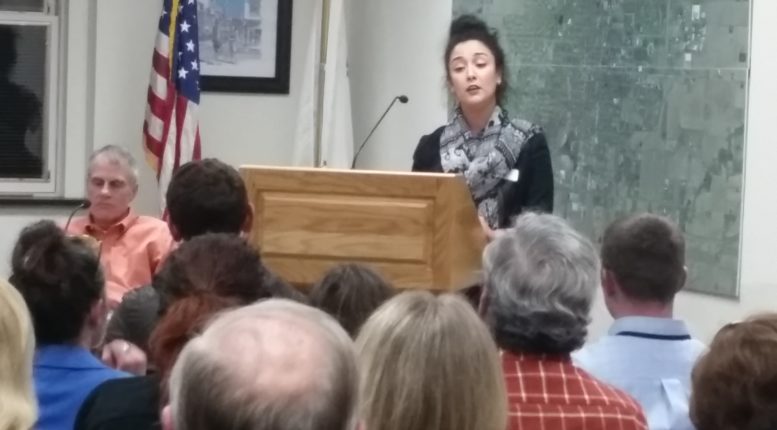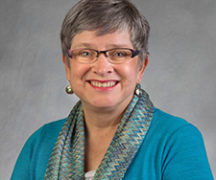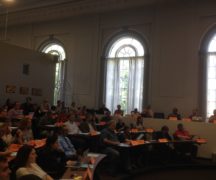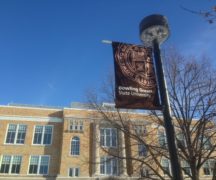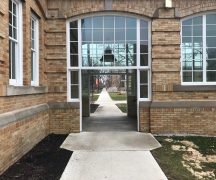By HOLLY SHIVELY
Special to BG INDEPENDENT NEWS
From being tear gassed in the streets of Tunisia during the Jasmine Revolution to working for students as Bowling Green State University’s Graduate Student Senate president, Amira Hassnaoui has stayed true to her passion—advocacy for equality of all people.
“I care because I care about the human experience,” she said. “We share a lot as humans—more than we think we do.”
While she didn’t grow up in a political family, Hassnaoui has time and time again found herself in political scenes, alongside journalists, scholars and underground musicians, fighting for the communities she cares about. Currently, that involves using her passion for advocacy in her Graduate Student Senate leadership role while completing her masters in popular culture.
“I really care a lot about my BG community, and I’m so passionate about what I do,” Hassnaoui said. “I’m so involved—it’s because I do care. It’s because I do think that we can be the best. We’re good now, but we can definitely be among the best…That passion was the ribbon of my own experience because I definitely know how it feels.”
While Hassnaoui has become the voice for international students, she said she advocates for students, whoever they are.
“I don’t believe a lot in just sitting in my office and wait for things to come to me. I’m more of a person like feet on the ground,” Hassnaoui said.
Since becoming an active member of the Bowling Green community, Hassnaoui has set forth as an information source and activist. In addition to serving as GSS president, Hassnaoui has additionally spoken on panels, most recently about the hijab, and joined in a city council conversation leading to the passage of an anti-Islamaphobia and anti-hate crime resolution.
“This is what America should be like,” Hassnaoui said. “The America that I was taught about growing up back home was the melting pot America. The diverse America. The America that you can be whoever you are without being threatened. You can succeed. You can follow your dream, and that’s what I’m trying to do.”
She’s also worked with Dr. Lara Lengel, a Professor in BGSU’s School of Media and Communications, who spent a year researching cultural, media, and gender studies in Tunisia. She has also returned to the nation to present at a United Nations summit and has written about social media’s roles in revolutions throughout the Middle East and North Africa. Hassnaoui’s interaction with Lengel includes presenting their individual work at the same student conference focused on the 15th anniversary of 9/11 and co-authoring a paper on the challenges of Tunisian women under colonial rule. Their paper has been accepted for presentation at the international Alcohol and Drugs History Association at Utrecht University in the Netherlands this June.
Lengel was enthusiastic to know a Tunisian student was studying at the university.
“She’s very inspiring to me,” Lengel said. She also complimented Hassnaoui’s intelligence and activism.
Amanda Dortch, the President of Bowling Green State University’s Undergraduate Student Government, has also worked closely with Hassnaoui throughout this academic year to bridge the gap between the university’s graduate and undergraduate students. They have worked on issues including health insurance, course fees, diversity issues and more.
“That’s what inspires me,” Hassnaoui said. “I want everyone to have the same chances and opportunities to be who they want to be…without being stigmatized, without being harassed.”
Dortch described Hassnaoui as powerful, extraordinary, intelligent and unafraid, with her greatest strength as her passion.
“She’s just one of those people who you feel just really care about you, and they’re not doing it for themselves, but they’re doing it for everyone,” Dortch said. “She will put herself out there, she will make herself available to you if you need her.”
Hassnaoui’s passion began long before her time in Bowling Green, when she lived and attended university in her home country of Tunisia. Her activism really started after missing one of the biggest protests in the country’s history because her mother was being protective and didn’t want Hassnaoui to go. The protest was on Jan. 14, 2011, when former president Zine El Abidine Ben Ali fled the country.
“That got to me,” she said. “I wanted to be part of that historical moment.”
When things started to calm down, Hassnaoui decided she had to get involved. At age 23, during her last semester of undergraduate, Hassnaoui started protesting. While she said she didn’t do as much as many of her previously politically active friends, Hassnaoui took part in more protests and marches than she could count in the spring of 2011.
“I started to develop a critical thinking about what was going on,” she said. “After the revolution, I found myself protesting on the streets because I realized there was a lot of corruption going on.”
Hassnaoui protested for reform, a better life for everybody, social justice and free speech. She wasn’t the only one.
Mohammed Bouazizi lit himself on fire to protest high unemployment and inability to support his family because of the bureaucracy that repeatedly fined him, confiscated his produce and denied access to a license to sell the goods, Lengel said.
“Before cell phones, such acts of protest and desperation may have happened, but few people knew of them due to the oppression of freedom of speech and the press,” she said.
In a time when people could have been beaten, threatened, killed or imprisoned for saying anything against a regime, social media, video and photography spread the message outside the country and other messages within as well, and protests increased.
The protests would soon spread to other nations in what has been coined the “Arab Spring” by Western journalists, Lengel said.
“Someone had to burn himself, put himself on fire, for us to realize that [there was corruption],” Hassnaoui said. “I guess a lot of people had realized that a long time ago, but for a lot of people like myself who did not have access to information that was shocking.”
Two specific protests left Hassnaoui with memories she’ll never forget.
The first was after the assassination of leftist Chokri Belaid, the first political assassination in Tunisia, at least from what the public had known with the lack of press coverage of such events in previous regimes.
Hassnaoui couldn’t believe there was an assassination after the revolution—that someone would murder instead of join the civil society.
She went to funeral and was tear gassed there by police, and it was caught on camera where her mom was viewing from home. Amira told her mom she was safely hiding, but her mom had just seen her on television. That day she was gone from 10 a.m. to 11 p.m., without transportation and in “complete chaos.”
Another time she was called a sexist slur by a policeman during a march.
“We were peacefully marching…and I really wanted to react,” she said. “To threaten my sexuality when the whole point of that was far from being about my sexuality as a woman, it hit me.”
Hassnaoui’s friend pulled her along, reminding her not to fight the authority that had guns and tear gas, but the man’s face was engrained in her mind the whole time.
“I will never forget that,” she said.
Hassnaoui said compared to other countries, Tunisia was the most successful even though it didn’t end how the youth wanted. Despite the less than ideal ending, Hassnaoui found the unity of the revolution promising for her country.
“That bond that all Tunisians had—that we’re all Tunisians, it didn’t matter where you came from. It was unforgettable,” she said.
She said the country still needs to work on education, social justice and reformation of laws and practices from former regimes.
However, the country is stable with a very active civil society full of youth.
“It’s not what we wanted, but it’s still much better in comparison to other countries,” she said.
Tunisia set the revolutions stretching from northern Africa and the Middle East into motion, a series of events that would come to be coined the “Arab Spring.”
Just as social media was used to spread news of protests, Amira and her friends used the platforms to give advice to revolutionaries in Egypt, offering advice, including mental support and information about her own experiences in Tunisia.
“When I went to Egypt for the first time I was so impressed with my Egyptian friends’ involvement,” she said.
Through Hassnaoui and other Tunisians revolutionaries, Egyptians modeled their revolution in the same steps as the Jasmine revolution.
Hassnaoui is now looking at Ph.D programs on the east and west coasts for after she graduates with her masters in popular culture in May. She hopes to stay in academia or work for the government as an ultimate goal.

